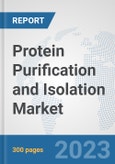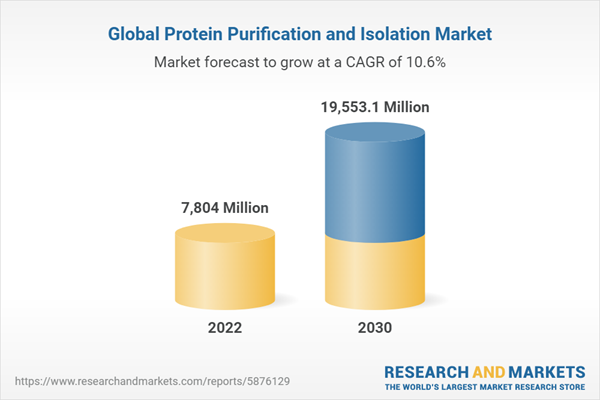Protein purification is a set of procedures designed to separate out a single protein or a small number of proteins from a complicated mixture, typically cells, tissues, or entire organisms. The specification of a protein's structure, function, and connections depends on its purification. The target protein will subsequently be isolated from all other proteins after the purification procedure separates the mixture's protein and non-protein components. To avoid contaminants from affecting the research of a protein's structure and function, it is ideal to isolate a protein of interest from other cell components before examining it. Additionally, the protein purification and isolation industry was a flourishing industry in the economy due to the increased need for high-quality proteins in multiple research, diagnostic, and therapeutic applications. The purification and isolation methods covered by the market included chromatography, electrophoresis, ultrafiltration, and centrifugation. The market was growing as a result of elements such as biotechnology developments, rising R&D spending, and the development of the pharmaceutical and biotechnology industries. The need for isolated and purified proteins was also fuelled by the increased incidence of chronic diseases and the need for personalized therapy. Biotechnology firms, academic institutions, and contract manufacturing businesses were among the major market participants, each of which provided a wide range of goods and services.
The global protein purification and isolation market is bifurcated by product type, technology, application, and end user. By technology, the segment is further bifurcated into ultrafiltration, precipitation, chromatography, electrophoresis, western blotting, and others. The ultrafiltration segment is anticipated to have a significant impact on market growth during the forecast period. Ultrafiltration (UF) is a technique used to remove dissolved molecules and incredibly minute particles from fluids. Molecular size serves as the main basis for separation, while the sample's chemical, molecular, or electrostatic characteristics may also have an impact on the filter's permeability. Molecules must be at least an order of magnitude apart in size and have a molecular weight between 1 KDA and 1000 KDA to be separated by ultrafiltration. The filtrate, or solution that has passed through the filter, can be cleaned using ultrafiltration membranes, and the retentate, or substance that the filter has retained, can be collected. The benefits of ultrafiltration and the widespread use of ultrafiltration for protein purification and isolation are the main factors influencing the segment's growth during the anticipated period. For instance, according to the MDPI in 2021, proteins in their concentrated forms, such as isolates, could be advantageous, and a variety of protein sources can benefit from membrane filtration techniques like ultrafiltration. The usage of ultrafiltration is also growing as a result of its benefits, including its high product throughput and ability to produce results quickly. Ultrafiltration is gaining popularity as a result of its ability to overcome the drawbacks of existing techniques like chromatography, which produce poor throughputs of product at extremely high costs and need complicated instrumentation support to operate well. Therefore, over the forecast period significant segment expansion is anticipated as a result of the aforementioned causes.
The global protein purification and isolation market is segmented into Asia Pacific, North America, Europe, the Middle East & Africa, and Latin America. North America is dominating region within the global market share. An established and sophisticated healthcare system in North America underpins significant pharmaceutical and biotechnology research and development efforts. An additional factor in the region's dominance is the presence of significant pharmaceutical businesses and research facilities. Increased research activity and rising governmental and private sector investments in R&D are some of the reasons contributing to the growth. For instance, according to Research America in 2022, the United States is expected to invest USD 245,127 million in 2020 in medical and health R&D, up from USD 221,438 million in 2019. Additionally, it stated that industrial players are now investing more money in R&D than they did in past years. The amount invested by the industry in 2020 was USD 161,766 million, compared to USD 148,205 million in 2019. Consequently, rising investment shows that both the public and private sectors are putting emphasis on creating novel and cutting-edge products which anticipated the growth of protein purification and isolation market.
Report Findings
1) Drivers
- Increasing demand for pure and active proteins for various applications in biotechnology, medicine, and research drives the market growth.
- Advancement in technology, such as chromatography, electrophoresis, and filtration techniques, have led to improved isolation processes, boosting market growth.
2) Restraints
- The inherent complexity of biological samples makes the purification process time-consuming and resource-intensive restraining the market growth.
3) Opportunities
- The increasing demand for personalized medicine and precision therapeutics presents an exciting opportunity for protein purification and isolation.
Research Methodology
A) Primary Research
The primary research involves extensive interviews and analysis of the opinions provided by the primary respondents. The primary research starts with identifying and approaching the primary respondents.The primary respondents are approached include
1. Key Opinion Leaders2. Internal and External subject matter experts
3. Professionals and participants from the industry
The primary research respondents typically include
1. Executives working with leading companies in the market under review2. Product/brand/marketing managers
3. CXO level executives
4. Regional/zonal/country managers
5. Vice President level executives.
B) Secondary Research
Secondary research involves extensive exploring through the secondary sources of information available in both the public domain and paid sources. Each research study is based on over 500 hours of secondary research accompanied by primary research. The information obtained through the secondary sources is validated through the crosscheck on various data sources.The secondary sources of the data typically include
1. Company reports and publications2. Government/institutional publications
3. Trade and associations journals
4. Databases such as WTO, OECD, World Bank, and among others.
5. Websites and publications by research agencies
Segment Covered
The global protein purification and isolation market is segmented on the basis of product type, technology, application, and end-use.The Global Protein Purification and Isolation Market by Product Type
- Instruments
- Kits
- Reagents
- Columns
- Others
The Global Protein Purification and Isolation Market by Technology
- Ultrafiltration
- Precipitation
- Chromatography
- Electrophoresis
- Western Blotting
The Global Protein Purification and Isolation Market by Application
- Drug Screening
- Biomarker Discovery
- Protein-protein Interaction Studies
- Diagnostics
The Global Protein Purification and Isolation Market by End-use
- Academic and Research Institutes
- Hospitals
- Pharmaceutical and Biotechnological Companies
- Others
Company Profiles
The companies covered in the report include- Thermo Fisher Scientific Inc.
- Bio-Rad Laboratories, Inc.
- Merck Millipore (acquired by Merck kGaA)
- QIAGEN
- Agilent Technologies, Inc.
- Promega Corporation
- Sigma-Aldrich Corporation (acquired by Merck Group)
- Purolite
- Roche Life Sciences
- Cytiva
What does this Report Deliver?
1. Comprehensive analysis of the global as well as regional markets of the protein purification and isolation market.2. Complete coverage of all the segments in the protein purification and isolation market to analyze the trends, developments in the global market and forecast of market size up to 2030.
3. Comprehensive analysis of the companies operating in the global protein purification and isolation market. The company profile includes analysis of product portfolio, revenue, SWOT analysis and latest developments of the company.
4. Growth Matrix presents an analysis of the product segments and geographies that market players should focus to invest, consolidate, expand and/or diversify.
Table of Contents
Companies Mentioned
- Thermo Fisher Scientific Inc.
- Bio-Rad Laboratories, Inc.
- Merck Millipore (acquired by Merck kGaA)
- QIAGEN
- Agilent Technologies, Inc.
- Promega Corporation
- Sigma-Aldrich Corporation (acquired by Merck Group)
- Purolite
- Roche Life Sciences
- Cytiva
Table Information
| Report Attribute | Details |
|---|---|
| No. of Pages | 300 |
| Published | August 2023 |
| Forecast Period | 2022 - 2030 |
| Estimated Market Value in 2022 | 7804 Million |
| Forecasted Market Value by 2030 | 19553.1 Million |
| Compound Annual Growth Rate | 10.6% |
| Regions Covered | Global |
| No. of Companies Mentioned | 10 |









